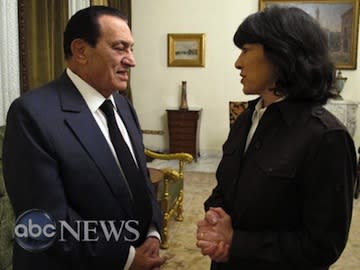 The Cutline
The CutlineABC’s Amanpour returns from Egypt

ABC's Christiane Amanpour has left Egypt, but she isn't leaving the story behind. As ABC correspondents report from the ground, Amanpour said she intends to keep covering the Egyptian uprising and U.S. foreign policy on Sunday's "This Week."
Amanpour, who spoke to The Cutline shortly after returning home Tuesday, said Egypt remains "a very important story" because promised political reforms could lay "the groundwork and the bedrock for a democratic process and a democratic future."
Before joining ABC News last year, Amanpour spent decades covering wars and unrest abroad for CNN. Over the past 10 days, she showed off those foreign correspondent chops as the only Sunday show host to head to Egypt.
Amanpour flew to Egypt on Jan. 28, as pro-democracy protests against Hosni Mubarak's authoritarian regime heated up. She covered the massive demonstrations at Tahrir Square and, like a number of foreign journalists, encountered violent, pro-Mubarak mobs when counter-demonstrations began.
But unlike other foreign journalists, Amanpour scored two exclusive interviews while in Egypt: Vice President Omar Suleiman and Mubarak himself.

Amanpour, who was scheduled to interview only Suleiman, asked if Mubarak was available while at the palace. Amazingly, he was. Although Mubarak wouldn't agree to an on camera interview, Amanpour was able to take photos and notes, later filing a story that got pick up around the world. She said that getting the only interview with Mubarak "was just phenomenal."
"This president was the heart of this story," Amanpour said. "The protagonist of this unfolding drama that nobody had seen."
Amanpour was one of several high-profile TV journalists to head to Egypt, along with CNN's Anderson Cooper, NBC's Brian Williams and CBS's Katie Couric. All four have returned to the United States, and it remains to be seen if the American news media will continue devoting as much time to Egypt as it has in the first phases on the protests. There certainly isn't any shortage of material, with large-scale demonstrations continuing, and a political status quo that is far from settled.
The U.S. media—which was a couple days late to the Jan. 25 uprising—has spent considerable airtime and resources to covering the situation on the ground in Cairo and within the corridors of power in Washington. Last week, Middle East unrest was the biggest story across network news, cable news, newspapers, magazines and radio, according to Pew's Project for Excellence in Journalism.
"People have been paying a huge amount of attention to it," Amanpour said.
Given Amanpour's reporting background, it's not surprising that she thinks it's "great" to see Americans following a major international story. Reporting abroad, she said, is something she's "always believed in."
U.S. news consumers have also turned increasingly over the past couple weeks to to Al Jazeera English, the five-year-old offshoot of the Arabic network that the Bush administration condemned for its critical coverage of American foreign policy in the Middle East. (Arab strongmen aren't Al Jazeera fans either: the Mubarak regime closed the network's Cairo bureau and arrested several of its journalists during the uprising).
Since U.S. cable providers don't offer Al Jazeera English, Americans have followed the network's comprehensive coverage of the Egyptian protests by way of a livestream online. Amanpour said she thinks cable providers should offer Al Jazeera.
"In my view, the more perspectives the better," Amanpour said. "This is the United States of America, the bastion of the free press. Anyone can get on cable, why not Al Jazeera?"
(Photo of Amanpour in Egypt and Amanpour interviewing Mubarak courtesy of ABC News)

